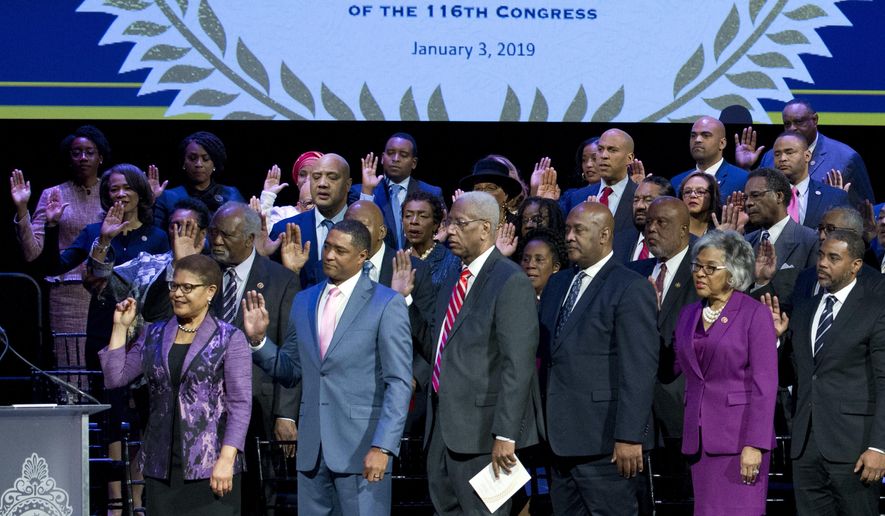OPINION:
In Deborah Simmons’ recent column “CBC is not black America’s BFF,” the author oddly blames the plight of black America on labor unions and the Democratic Party.
Predictably rather than thoughtful analysis and an honest accounting of why black America must fight — especially in the Trump-era — the author relies on baseless rhetoric conservatives have used for generations to suggest the Congressional Black Caucus (CBC) does not fight for our communities. Yet the author offers no solutions or accomplishments of note to address any of the problems facing black America.
This is an old and tired strategy of blame the African-Americans and Democrats instead of attacking the systemic racism and under-investments that allow chronic poverty to exist in the richest nation on earth.
We saw it recently when Donald Trump attacked Baltimore, a majority African-American city with black leadership. Hypocritically President Trump referred to Baltimore as rat- and rodent-infested just months after his administration tried to end a successful rat-elimination program in the city.
Had the author done more research, she would have quickly found the Black Caucus not only fights for black America, but most importantly we win real victories every day.
Since our founding 48 years ago, our members passed legislation that led to the creation of thousands of Black-owned businesses by making sure African-Americans had access to federal contracts. Our members contributed to the downfall of the Apartheid regime in South Africa by forcing the United States to sanction that government.
During the Affordable Care Act debate, Black Caucus members pushed for resources to address health disparities in communities of color. We put $50 million in the last Farm Bill for financial aid to students attending historically black colleges and universities.
Black Caucus members are the reason the Consumer Financial Protection Bureau exists and historic investments were made in community banks to help communities recover from the last recession.
We’ve even reached across the aisle to work with a president absolutely committed to turning back the clock by stoking hate and division, and passed historic criminal and juvenile justice reform legislation.
And right now, our members have led in passing gun control legislation that the events in Dayton Ohio and El Paso Texas remind us are sorely needed. Congressman Bobby Scott has led the way in passing an increase in the federal minimum wage to $15 an hour. Both bills right now are awaiting action in the Senate.
We’ve drawn attention and are working to address issues like rising suicide rates for black teens and the staggering number of black women dying during childbirth.
Our latest Census 2020 task force is working to ensure African-Americans are properly counted in the upcoming census so that our communities do not lose billions of dollars in funding over the next decade.
We are more than black Americas “BFF,” we are its champion.
Ms. Simmons also fails to note it’s impossible to diagnose today’s ills without a full and honest accounting of America’s tortured past of slavery, segregation and voter suppression. There is a direct correlation between these three ills and the work that lay ahead to achieve full racial and economic equality for black Americans. This year marks 400 years since the first Africans forced into slavery were recorded in the United States.
Following 250 years of slavery, black America endured 100 more years of Jim Crow and segregation, with the government actively working to lock African-Americans out of the wealth our ancestors created but never would benefit from.
Black communities today are still carrying the plight of ills began 400 years ago. Slavery gave way to Jim Crow and Segregation, which led to Redlining, which takes us up too the present. A study from the National Community Reinvestment Coalition found racial discrimination in mortgage lending during the 1930s determined much of our reality 90 years later. Neighborhoods redlined in the 1930s were predominantly African-American and loans to those communities were unavailable or expensive which made it much more difficult for Blacks to purchase homes and acquire wealth in comparison to their white counterparts.
Decades later, the study found nearly two-thirds of the neighborhoods that were redlined remain minority communities, while those judged more favorably and granted access to loans continue to be middle-to-upper-income and white.
The labor movement and others, are in fact how many black Americans have reclaimed some of what is owed. Yes there is always more work to be done, but the real culprits are not those of us fighting on the frontlines every day. That distinction belongs to those who ignore history and the very real impacts the legacies of slavery, Jim Crow and voter suppression continue to have on black communities today.
The Black Caucus meanwhile will keep our eyes on the prize.
• Karen Bass, a Democratic U.S. representative from California, is chair of the Congressional Black Caucus.




Please read our comment policy before commenting.